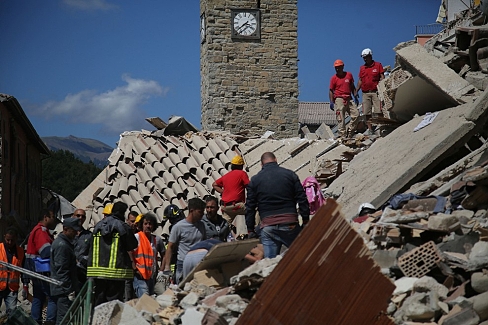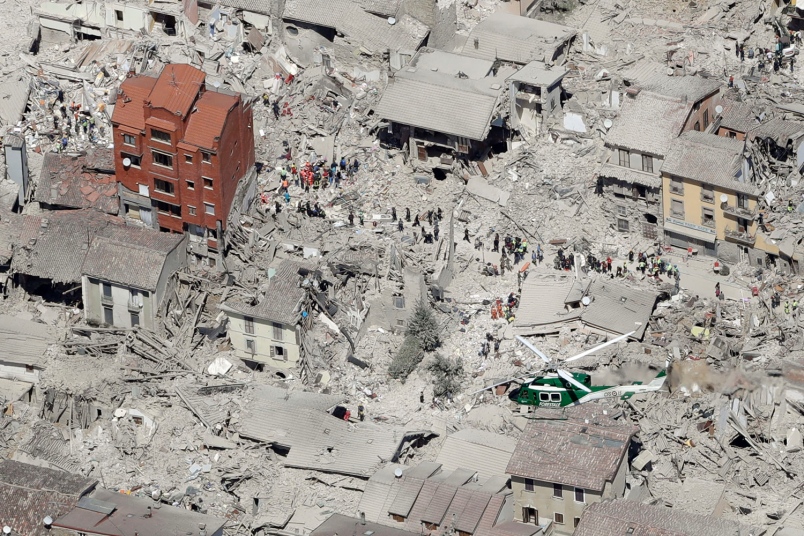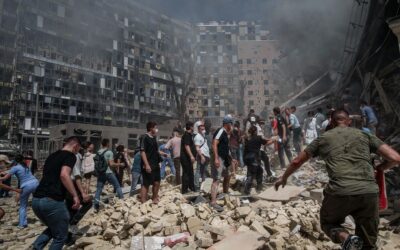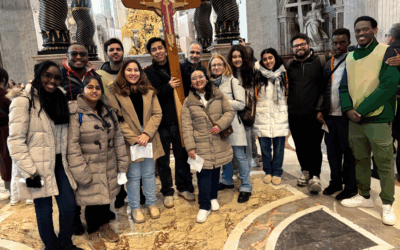 That clock tower on Amatrice church indicating 3:36 am is a powerful image for what happened this night. That minute was the last minute for many victims, it will be a minute forever remembered because it is written in the flesh and hearts of their families. And it will be remembered by our country, whose recent history is also a series of clocks stopped forever by the violence of men and of the earth. I will also remember it forever, because this cry of the earth also reached the house of my parents in Roccafluvione, around twenty kilometres from Arquata del Tronto, where I am visiting them. It was a long night of fear, suffering and thoughts for Amatrice, Arquata, Accumuli, towns of my childhood, close to where my grandparents come from, villages where I would accompany my father as he went about his business selling chickens. And then there were thoughts, thoughts we never have, because you can only have them on these terrible nights. I thought about all the time that clock had measured right up until 3.36. It stopped there, dead, but it was only one dimension of time which the Greeks called ‘kronos’: the surface, the soil of time. In the world there is our managed time, domesticated, constructed, which live by. But beneath it there is a another time: the time of the earth. This non-human time, and at times inhuman, and commands the time of men, mothers and children. And I thought that we are not the masters of this other time, which is deeper, abysmal, primitive, which doesn’t follow our path, and at times is against the paths of those who walk above. On such momentous nights we become aware of this different time, on which we walk and build our homes, and that we are ‘grass of the field’, watered and nourished by the sky, but also swallowed up by the earth.
That clock tower on Amatrice church indicating 3:36 am is a powerful image for what happened this night. That minute was the last minute for many victims, it will be a minute forever remembered because it is written in the flesh and hearts of their families. And it will be remembered by our country, whose recent history is also a series of clocks stopped forever by the violence of men and of the earth. I will also remember it forever, because this cry of the earth also reached the house of my parents in Roccafluvione, around twenty kilometres from Arquata del Tronto, where I am visiting them. It was a long night of fear, suffering and thoughts for Amatrice, Arquata, Accumuli, towns of my childhood, close to where my grandparents come from, villages where I would accompany my father as he went about his business selling chickens. And then there were thoughts, thoughts we never have, because you can only have them on these terrible nights. I thought about all the time that clock had measured right up until 3.36. It stopped there, dead, but it was only one dimension of time which the Greeks called ‘kronos’: the surface, the soil of time. In the world there is our managed time, domesticated, constructed, which live by. But beneath it there is a another time: the time of the earth. This non-human time, and at times inhuman, and commands the time of men, mothers and children. And I thought that we are not the masters of this other time, which is deeper, abysmal, primitive, which doesn’t follow our path, and at times is against the paths of those who walk above. On such momentous nights we become aware of this different time, on which we walk and build our homes, and that we are ‘grass of the field’, watered and nourished by the sky, but also swallowed up by the earth.  The earth, the real one and not the romantic and naive one of ideologies, is both mother and stepmother. The hummus generates man but also turns him back into dust, sometimes in a good way at the right time, but other times it is bad, and too soon, with a so much suffering. Biblical humanism knows this very well, but for this has fought a lot with the pagan cults of local peoples who wanted to make a divinity of the earth and its nature: the power of the earth has always fascinated men who have tried to ‘buy’ it with magic and sacrifices. Whilst I tried in vain to go back to sleep, I thought about the tremendous books of Job and Qohelet, which you can understand on such nights. Those books tell us that no God, not even the real one, can control the earth, because He too, once he entered into human history, became a victim of the mysterious freedom of his creation. God cannot even explain to us why children die squashed beneath the ancient pillars of our towns. He can’t explain it to us because if he knew why he would be a monstrous idol. God, who today looks on the land of the three As – Arquata, Accumuli and Amatrice – can only ask himself the same questions as us: he can cry out, remain silent, cry together with us. He can perhaps remind us with the words of the Bible that all is vanity of vanities: everything is breath, wind, mist, waste, nothing, ephemeral. Vanity in Hebrew is written Habel, the same word as Abel, the brother killed by Kane. Everything is vanity, everything is an infinite Abel: the world is full of victims. This we know. We know it, we forget it too often. These terrible nights and days make us remember. * 1 Kings 19:11
The earth, the real one and not the romantic and naive one of ideologies, is both mother and stepmother. The hummus generates man but also turns him back into dust, sometimes in a good way at the right time, but other times it is bad, and too soon, with a so much suffering. Biblical humanism knows this very well, but for this has fought a lot with the pagan cults of local peoples who wanted to make a divinity of the earth and its nature: the power of the earth has always fascinated men who have tried to ‘buy’ it with magic and sacrifices. Whilst I tried in vain to go back to sleep, I thought about the tremendous books of Job and Qohelet, which you can understand on such nights. Those books tell us that no God, not even the real one, can control the earth, because He too, once he entered into human history, became a victim of the mysterious freedom of his creation. God cannot even explain to us why children die squashed beneath the ancient pillars of our towns. He can’t explain it to us because if he knew why he would be a monstrous idol. God, who today looks on the land of the three As – Arquata, Accumuli and Amatrice – can only ask himself the same questions as us: he can cry out, remain silent, cry together with us. He can perhaps remind us with the words of the Bible that all is vanity of vanities: everything is breath, wind, mist, waste, nothing, ephemeral. Vanity in Hebrew is written Habel, the same word as Abel, the brother killed by Kane. Everything is vanity, everything is an infinite Abel: the world is full of victims. This we know. We know it, we forget it too often. These terrible nights and days make us remember. * 1 Kings 19:11
Allow yourself to be wounded by compassion
Allow yourself to be wounded by compassion




0 Comments